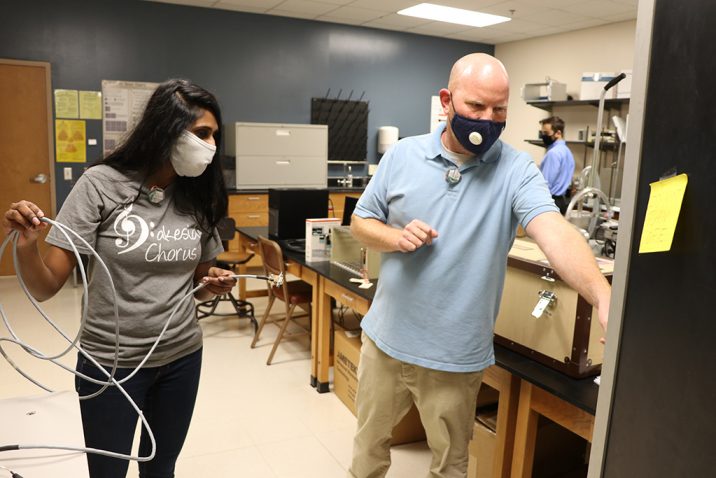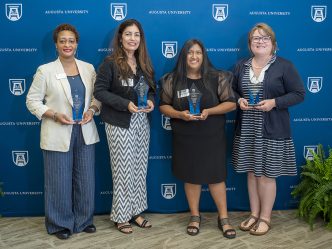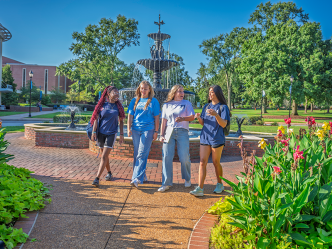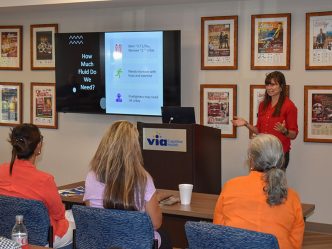Augusta University has received an additional grant from the National Nuclear Security Administration (NNSA) of the Department of Energy to support scholarships for students interested in nuclear science.
The latest grant is the third the university has participated in as a member of a consortium of five regional colleges collaborating with the Savannah River Site Community Reuse Organization. The grant is designed to support regional workforce development related to long-term missions at the Savannah River Site. Augusta University plans to use this funding, which will carry a yearly budget of $146,219, to engage students early in their college experience to pursue degree tracks that are supportive of NNSA long-term workforce needs.
The grant is attached to the Workforce Opportunities in Regional Careers II (WORC II) program, and accompanies the ongoing WORC I grant that has enjoyed tremendous success over the past several years.
Dr. Joseph Newton is the principal investigator for the grant. An assistant professor of physics and director of nuclear science in the Department of Chemistry and Physics, he teaches three nuclear courses, advises all nuclear track chemistry and physics majors, and chairs the nuclear science scholarship interview committee funded by the existing WORC grant.
The NNSA awarded this grant due to the successes of the current program. The Nuclear Workforce (NuWork) is a training concept in the WORC II Program and was established with existing WORC I college/university partners. It is focused on enhancing existing training programs or establishing new curriculum for training programs that align with NNSA enduring workforce demands.
“The nuclear science tracks have a strong record of graduation and retention of students and these students have a very high job placement rate,” Newton said. “The students who complete internships at SRS are very often sought after to stay on beyond the internship period to work part-time while still in school, with some later gaining full-time employment after graduation.”
Five colleges and universities in the Georgia and South Carolina area comprise the consortium: Augusta University, Augusta Technical College, Aiken Technical College, USC Aiken and USC Salkehatchie. NuWork is heavily focused on programs and activities related to science, technology, engineering and mathematics (STEM) skill development.
Newton said AU is focusing primarily on the physics and chemistry curriculums while recruiting in all science and math disciplines. Any student pursuing science and math majors who is interested in a career in the nuclear workforce and meets the requirements is eligible to apply for the nuclear science scholarships.
The start date was originally set for April, but because of the COVID-19 pandemic, the start period was pushed back to begin in August and run through August 2025. Newton said they have been using the past few weeks to adjust the reporting schedules and make any changes necessary before moving forward.
Newton said AU will use the majority of the grant on scholarships over the five years to help recruit and engage incoming freshman and sophomores.
“The NNSA wanted to invest more money into this work grant and what we decided to do was focus primarily on freshmen and sophomore scholarships, trying to see if we can convince students who might not be choosing to focus on science to begin with, to research nuclear science and see what that field has to offer,” Newton said.
The project will also develop a new K-12 teacher workshop to help attract prospective students by first engaging their teachers in understanding nuclear technology.
Another goal is to connect students to NNSA-related fields of research and scientists who are working in those fields while continuing to develop the relationship with SRS employers involved in NNSA mission support. AU will also develop strategies to increase the number of students who complete internships and other workforce experience opportunities that better prepare them for permanent positions in NNSA-related careers.
There are also plans to begin a seminar series that focuses on the types of research projects and workforce needs at federal nuclear sites.
Newton, who graduated from AU in 2002, said the opportunity for the university to have this kind of program should increase the number of students who want to pursue a career in nuclear science.
“We’ve had really good luck finding internship positions at SRS for students who are pursuing the nuclear track and are interested in completing internships in the nuclear workforce,” Newton said. “We are also beginning to see exciting increases in the number of our graduates obtaining full-time, permanent positions in exactly the types of nuclear jobs that this grant was designed for. We’ve had three graduates obtain full-time positions in the past six months at SRS. This shows that we are producing the kind of students that are needed in the nuclear workforce.”
Drs. Tom Crute and Tom Colbert are assisting Newton on the project. Crute is a chemistry professor and chair of the Department of Chemistry and Physics. He will provide administrative support and advice for any issues related to grants. He also serves on the scholarship committee and teaches junior and senior level chemistry courses. Colbert is a physics professor and as assistant department chair serves as program director of the physics curriculum.
 Augusta University
Augusta University




